12 clever ways to have more fun with your dog on walks
Looking for inspiration to have more fun on your dog walks? We’ve got you covered
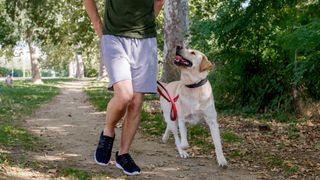
Who doesn’t want to have fun on dog walks? A great opportunity to get physically active and strengthen the bond you share with your pup, walking with your canine companion is also an opportunity to connect with other pet parents and dogs, as long as your dog is comfortable hanging out with others.
Walks are usually a highlight of our dogs’ days. With limited choices to entertain themselves, a walk provides a good physical workout, plenty of sniffing opportunities, and the chance to engage their brain through training with you. There are many reasons why you should let your dog sniff on a walk - including lowering blood pressure, reducing stress, and providing lots of feel good hormones.
If we’re honest though, there can be times when the dog walks move from your ‘fun’ list, to the ‘to do’ list. When life gets busy, it can become something you have to just ‘fit into your day’ as opposed to being a highlight.
With a little creativity and a few simple strategies, you can make your dog's walks more enjoyable for both of you. So, if you’re currently finding walks a little mundane, we are here with 12 top ideas for how to have more fun with your dog on walks. Pack up those best dog treats, pop on their harness, and embrace those walking experiences!

Caroline Wilkinson is a Certified Animal Behaviourist. She is a Full (assessed) Member of the APDT and INTODogs – as well as a Registered Training Instructor (ABTC). Caroline is also a Certified Real Dog Yoga Practitioner and an Applied Canine Zoopharmacognosist.
1. Explore new routes
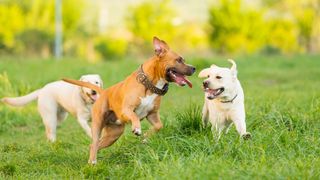
Dogs love to discover new scents and environments. If you want to have fun on your dog walks, the best thing you can do is to break away from your usual route. Think about exploring different paths, parks, or neighborhoods — even just switching up one small section of your walk will give your dog new places to sniff.
While our dogs are pretty good at being totally present in the moment — experiencing each adventure as ‘new’ — going to new locations is a way to provide them with a more enriching experience. Alongside giving your dog some lovely mental stimulation for your dog, walking somewhere new will keep you feeling more engaged and excited.
2. Turn walks into a learning opportunity
Take some time on each walk to either practice an old trick or try out a new one. While it can be useful to start all learning at home so your dog can take on the new instructions more easily, walks are a great time to get extra practice in new locations.
You can practice asking your dog to recall back to you, work on some proximity games such as a hand target, or just play with some basic obedience exercises. Adding in some training time to your walks, will not only make them more enjoyable but also strengthen the bond between you and your dog.
3. Play hide and seek
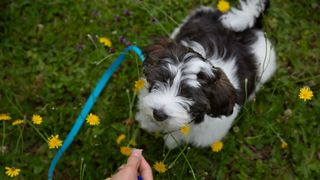
Dogs love to sniff, so a game of hide and seek is a perfect way to entertain them on a walk. Throw a treat away from your intended hiding spot, then hide yourself behind a tree or bush. Call their name but don’t show yourself, so they need to seek you out. Add in the reward of a game of tuggy or some tasty treats, alongside warm praise when they find you!
4. Catch up with friends
Arrange to meet up with your dog’s favorite canine or human pals whenever you can. This not only provides your dog with some fun social time but has the added bonus of human interaction time for you too! Playing with another dog will also give your dog a more physical workout than exploring the world solo. If your dog finds interactions with people or dogs worrying, then work with a force-free behaviorist to help support them in navigating social situations more effectively.
5. Have some off-leash fun
If your dog’s recall isn't reliable or they’re attached to a long training leash, then allow your dog the freedom to explore more of the environment you’re walking in with some time off-leash. Make sure first that off-leash walks are permitted and you’re not near any dangers such as cliff edges. Time off-the leash, or on a longer leash, means your dog will work their body more, can have a chance to socialize more easily, as well as getting a chance to sniff more of the world around them.
6. Swap ‘fetch’ for ‘find it’

Avoid relying on ball launchers as a way to exercise your dog — these can raise adrenaline levels and impact your dog’s physical wellbeing from the repetitive chasing/stopping motion. Instead, hide your dog’s toys (or even some treats if your dog’s not ball-mad!) into the long grass or under leaves. Playing ‘find it’ turns your walk into a fun treasure hunt!
7. Doggy parkour
As long as your dog is physically capable and they aren’t likely to get injured, use the natural world to create your own parkour course. Obstacles for your dog to jump over or hop up onto can include tree stumps, benches, or logs. Guide your dog through the course, giving plenty of tasty treats for their efforts along the way.
8. Splash about
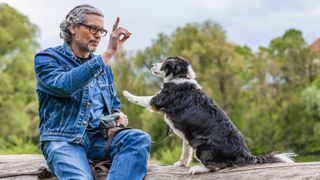
If there's a dog-friendly beach, lake, or river nearby, take your dog for a swim during the walk. Many dogs love playing in the water and it adds an exciting element to their walk. If your dog prefers to paddle than swim, choose the right depth of water. Always check for the latest current reports, safety of the water, and stay connected to your dog with a long training leash.
9. Scentwork
Sniffing is one of the best activities for our dogs. It lowers arousal and provides a dopamine hit each time your dog finds something good. On walks, you can introduce elements of tracking or man-trailing — or simply just scatter food for your dog to sniff as if following a Hansel and Gretel trail.
Check out I tried a 45-minute 'sniffari', and it tired out my border collie more than a two-hour hike! for a great first person account of the benefits of sniffing.
10. Go faster
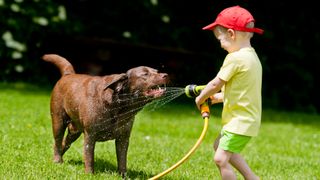
Want to up the pace of your walks? If your dog is physically fit and the weather isn’t too warm, CaniCross is a great way for you to speed up your walks. It’s a dog-sport where you attach yourself to your dog with a bungee and run together. Your dog will learn new cues for stopping and starting or changing direction. It’s always a good idea to seek out a local training group to help you get started in a new dog sport, to make sure neither of you are likely to get injured and have the most fun on these new speedier walks!
11. Share a picnic
Break up your walk with a tasty snack or meal. You can share some dog-friendly fruits and veg or pack a long lasting chew for your dog while the humans enjoy a larger spread. What strengthens bonds more than eating together? Just make sure you don’t start back off on your walk too quickly after eating to ensure proper digestion for all.
Check out our guide to 'what human foods can dogs eat?' for our vet's advice on how to safely give your dog a little treat.
12. Mindful breathing
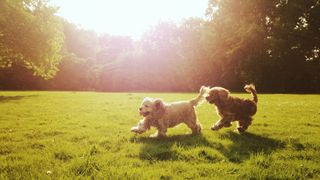
With the busy pace of life, it’s important to slow things down sometimes to keep a check on our stress levels. Mindfulness brings our focus to the present moment — by slowing our breathing and being really aware of the air we’re taking in. Sniffing is your dog’s own mindful breathing, so when they stop to sniff a patch of grass or a tree stump, focus on your own breath for a few moments.
Breathe in through your nose to the count of 4, hold it for the count of 7, then breathe out through your mouth to the count of 8. Try to repeat this for 2-3 minutes. This technique is especially useful for parents of more anxious dogs, as it will help reduce your stress so you don’t send any negative emotions down the leash.
Remember, to have fun on your dog walks, try to be creative. Focus on providing opportunities for both physical exercise and mental stimulation. By exploring new routes, incorporating training, allowing off-leash time where appropriate, and adding lots of tasty food or toy play, you'll create a more enjoyable and rewarding experience for both you and your dog.
PetsRadar Newsletter
Get the best advice, tips and top tech for your beloved Pets
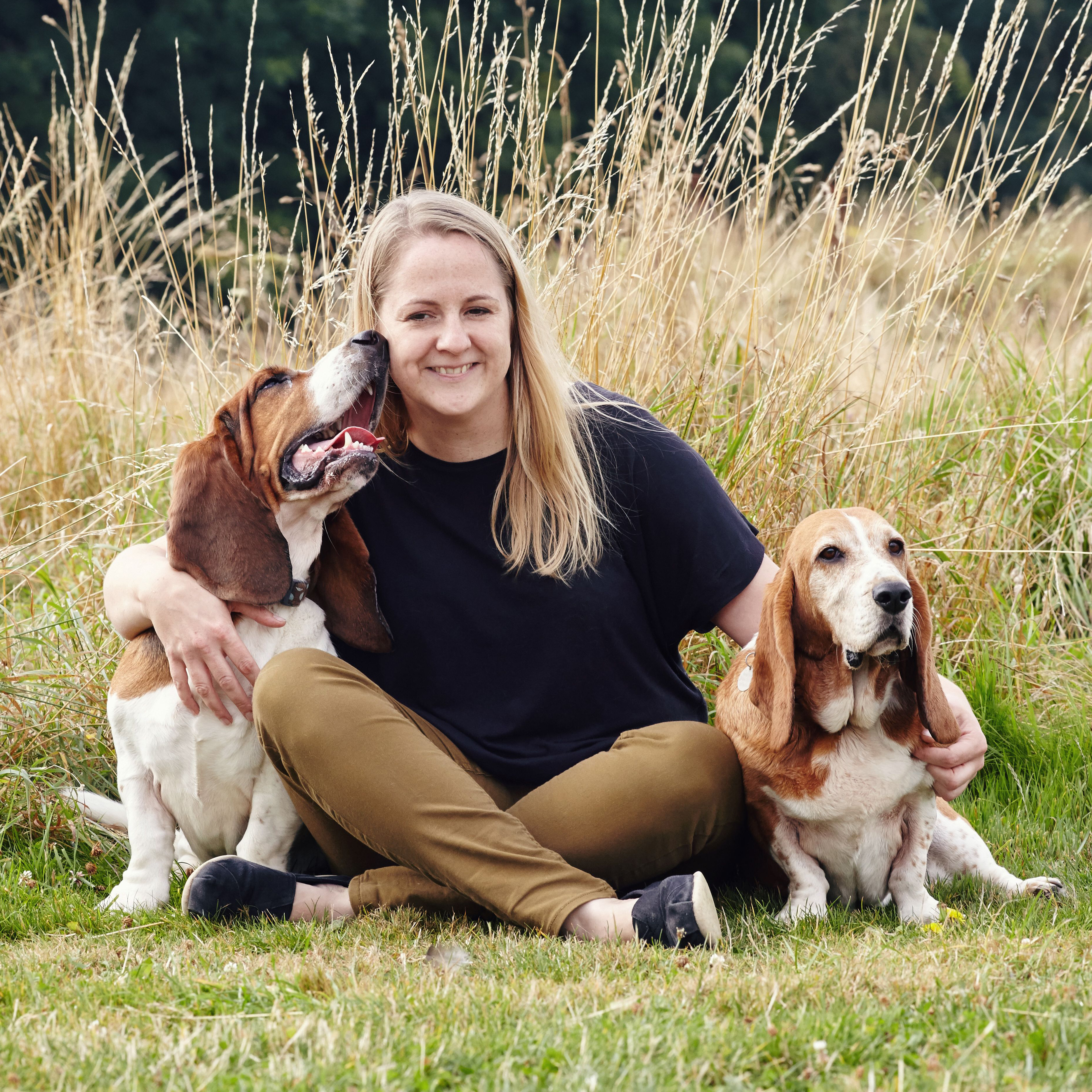
Caroline Wilkinson is a Certified Animal Behaviourist. She is a Full (assessed) Member of the APDT and INTODogs – as well as a Registered Training Instructor (ABTC). Caroline is also a Certified Real Dog Yoga Practitioner and an Applied Canine Zoopharmacognosist.